Table of Contents
Spark Plug Misfire in the Mercedes-Benz A45S AMG with M139 Engine: A Case Study
A spark plug misfire is a common but serious issue that can affect any modern engine. In a high-performance vehicle like the Mercedes-Benz A45S W177 AMG, powered by the M139 2.0L turbocharged engine, even a small misfire can be felt immediately. Symptoms like rough idling, reduced fuel efficiency, or noticeable vibrations not only ruin the driving experience but can also lead to long-term damage if ignored.
In this case study, we’ll examine a real-world example of a Mercedes-Benz A45S AMG misfire caused by faulty spark plugs. You’ll see the diagnostic process, visual inspection findings, repair steps, and lessons learned to help prevent similar problems.
Vehicle Overview
- Model: Mercedes-Benz A45S AMG (W177)
- Engine: M139 2.0L Turbocharged Inline-4
- Customer Complaint: Check engine light on, noticeable vibrations during driving

Initial Complaint
The owner of the A45S reported:
- – Check engine light illuminated
- – Unusual vibrations during acceleration and idling
- – Reduced smoothness in performance
Because the M139 is tuned for maximum performance, minor issues are amplified and become noticeable quickly.
Diagnostic Process
1. Fault Code Scan
Using the Mercedes-Benz Diagnostic system (Autel), a scan of the engine control module (ECM) revealed the code:
- – P030200: Combustion misfiring detected in cylinder 2
This confirmed a cylinder-specific misfire. However, fault codes only identify the symptom the cause still needed investigation.

2. Visual Inspection of Spark Plugs
The spark plugs from all cylinders were removed and examined. Cylinder 2’s spark plug showed several defects:
- – Electrode erosion / burned tips; indication of extreme heat and inconsistent spark.
- – Carbon buildup; excessive deposits preventing proper spark formation.
- – Cracked ceramic insulator; risk of spark leakage.
- – Melted ground electrode; severe overheating reducing efficiency.
Multiple defects pointed to spark plug failure as the root cause of the misfire.
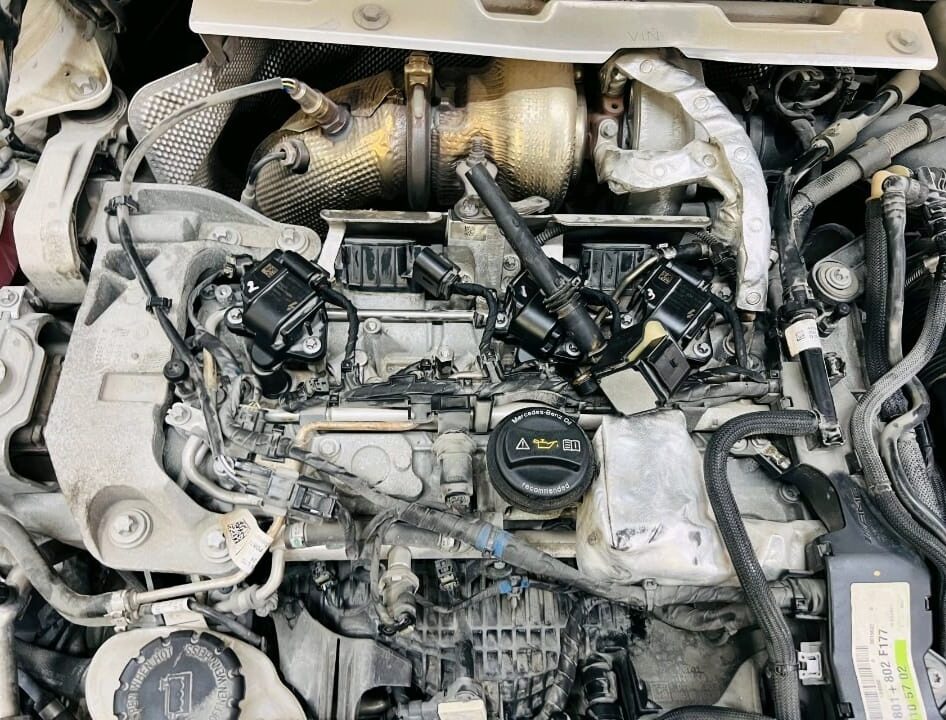
3. Cross-Checking Other Components
To ensure accuracy, technicians also checked:
- – Ignition coil; no cracks, passed resistance tests.
- – Wiring harness & connectors; properly seated and corrosion-free.
- – Fuel injector balance; values within specification.
With other systems functioning normally, the diagnosis of faulty spark plugs was confirmed.
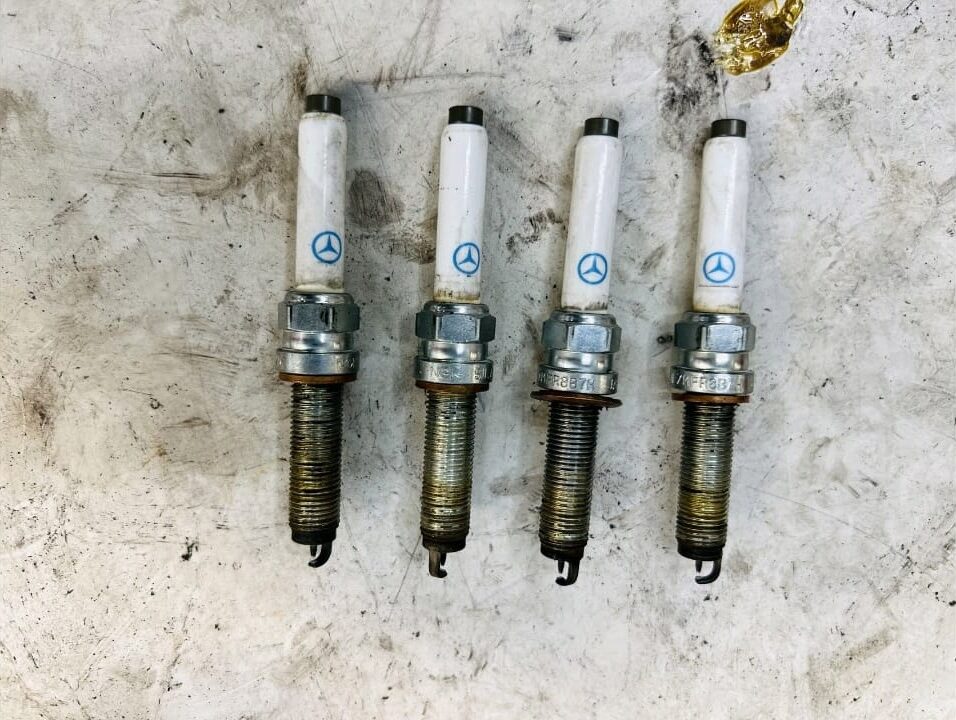
Repair Resolution
Step 1: Spark Plug Replacement
- – All spark plugs were replaced with new high-performance OEM spark plugs.
- – Proper gapping was checked before installation.
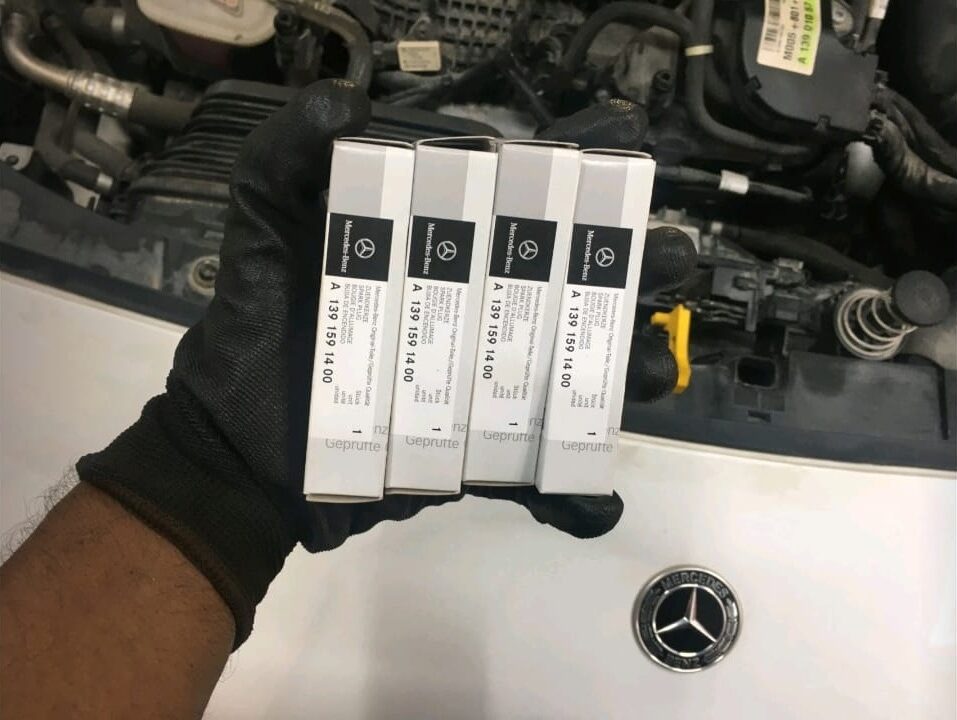

Step 2: System Reset
- – ECM fault codes were cleared.
- – Adaptation values reset to ensure fresh monitoring.
Step 3: Verification Tests
- – Engine restarted no misfire detected.
- – Live data showed stable smooth running across all cylinders.
- – Test drive confirmed restored performance: smooth acceleration, no vibrations, CEL off.

Result: Misfire resolved by spark plug replacement.
Symptom – Cause – Fix Table
| Symptom | Possible Cause | Fix |
|---|---|---|
| Check engine light + vibration | Spark plug misfire | Replace spark plugs with OEM parts |
| Misfire isolated to one cylinder | Worn spark plug electrode | Inspect & replace plug, check gap |
| Rough idle & poor fuel economy | Carbon buildup on plugs | Replace plugs, use high-quality fuel |
| Persistent misfire after spark plug change | Ignition coil failure | Swap coils between cylinders to confirm |
| Misfire across multiple cylinders | Fuel injector or wiring fault | Inspect injectors, test wiring harness |
Explore More Mercedes Engine Misfire Issues
For a deeper dive into all misfire-related problems, visit our hub page: Mercedes Engine Misfire Issues – Causes and Fixes. You’ll find grouped case studies, step-by-step diagnostics, symptom–cause–fix tables, and prevention tips to help you resolve misfire problems quickly and effectively.
Preventive Measures
To avoid misfire issues in the M139 engine:
- – Follow Mercedes-Benz service intervals; spark plugs typically replaced every 60,000 km (40,000 miles).
- – Use OEM or high-quality iridium/platinum spark plugs.
- – Avoid prolonged aggressive driving on worn plugs, which accelerates damage.
- – Inspect plugs annually for wear, deposits, or cracks.
- – Maintain fuel quality; premium fuel reduces deposits that foul spark plugs.
How Often Should Spark Plugs Be Changed?
1. By Type of Spark Plug
- – Copper plugs: 20,000–30,000 miles
- – Platinum plugs: 60,000–100,000 miles
- – Iridium plugs: Up to 100,000 miles
- – Double platinum/iridium: 100,000+ miles
2. By Manufacturer Recommendations
Mercedes-Benz specifies spark plug replacement every 60,000 km (40,000 miles) for the A45S AMG with the M139 engine. Always refer to the owner’s manual.
3. By Driving Conditions
- – Severe conditions (stop-and-go, track use, hot climates): Replace earlier than recommended.
- – Normal conditions: Follow scheduled intervals.
4. Signs Spark Plugs Need Replacement
- – Engine misfires or hesitation
- – Drop in fuel efficiency
- – Hard starting in cold weather
- – Rough idle or poor acceleration
- – Visible electrode wear or carbon buildup
FAQs on Spark Plug Misfires
Q1: What causes spark plugs to fail in the M139 engine?
Heat, carbon deposits, electrode erosion, or cracks in the insulator can cause failure.
Q2: Can driving with a misfire damage my Mercedes?
Yes. Misfires can harm the catalytic converter and reduce engine lifespan.
Q3: How do I know if it’s a spark plug or an ignition coil?
Swapping coils between cylinders helps isolate the problem if misfire moves, it’s the coil; if not, it’s the plug.
Q4: How much does spark plug replacement cost for an AMG A45S?
On average, €250–€400 depending on labor and OEM parts.
Q5: What spark plugs should be used in the M139 AMG engine?
Always use OEM-specified iridium or platinum spark plugs designed for high-performance engines.
Conclusion
This case study of the Mercedes-Benz A45S AMG with the M139 engine highlights how a spark plug misfire can be diagnosed and resolved. A faulty spark plug in cylinder 2 was identified as the cause, and replacing all plugs restored the engine to its legendary AMG performance.
The lesson is clear: regular spark plug inspection and timely replacement are critical in high-performance engines. Addressing misfires promptly not only restores smooth driving but also protects against costly long-term damage.
Author
Written by: Mercedes Expert
Automotive Technical Trainer & Mercedes-Benz Diagnostic Specialist
With years of hands-on experience repairing and diagnosing Mercedes-Benz vehicles, specializes in case-study-based troubleshooting guides that blend workshop accuracy with educational clarity.
Last Updated: September 2025

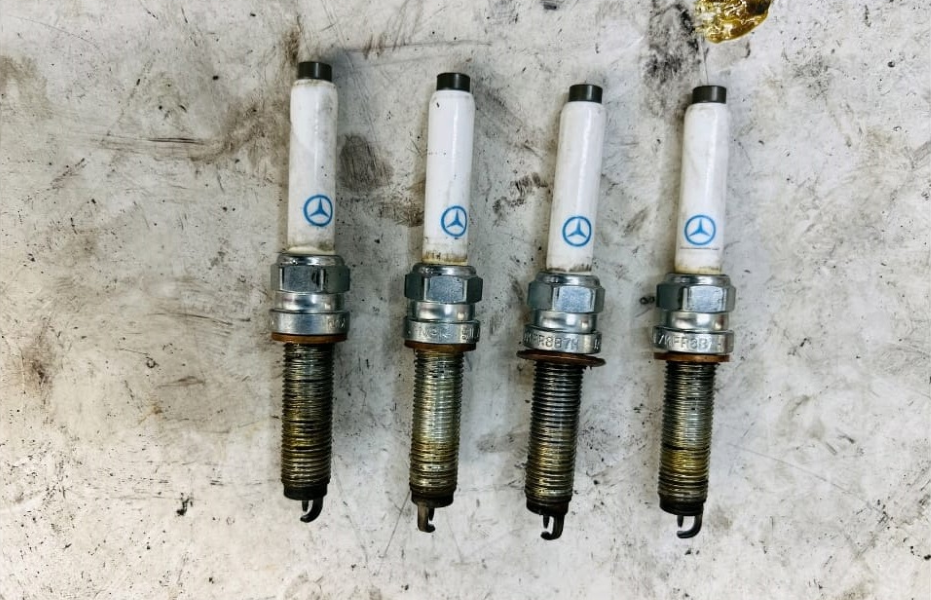
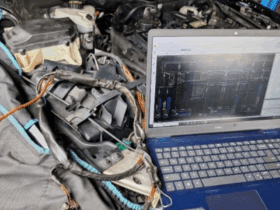
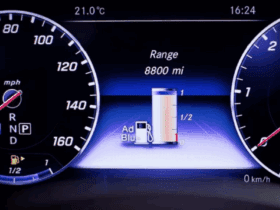


Leave a Reply